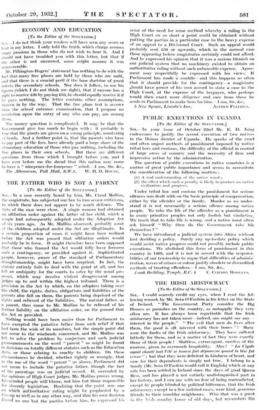THE FATHER WHO IS NOT A PARENT [To the Editor
of the SPECTATOR.] Sir.,—In a case recently heard by him, Mr. Claud Mullins, the magistrate, has subjected our law to two severe criticisms, to which there does not appear to be much defence. The facts of the case were clear. A single woman had obtained an affiliation order against the father of her child, which a couple had subsequently adopted under the Adoption Act of six years ago. As Mr. Mullins observed, probably most of the children adopted under the Act are illegitimate. In a certain proportion of cases it might have been realized before the Act was passed that affiliation orders would probably be in force. It might therefore have been supposed that those who framed the Act would fully have foreseen such a contingency, or provided against it. Sophisticated people, however, aware of the standard of Parliamentary draughtsmanship, might have been sceptical. In fact, the statute entirely fails to deal with the point at all, and has left an ambiguity for the courts to solve by the usual pro- cesses, which may involve violent disagreement among judges up to and within the highest tribunal. There is a provision in the Act by which, on the adopters taking over the child, the rights, duties, obligations and liabilities of the parents also fall on them, the parents being deprived of the rights and relieved of the liabilities. The natural father, as a parent, thus came to Mr. Mullins to be relieved of his further liability on the affiliation order, on the ground that the Act so provided.
Nothing would have been easier than for Parliament to have excepted the putative father from such relief if that had been the wish of its members, but the simple point did not. occur to the wiseheads concerned, and Mr. Mullins was left to Solve the problem by conjecture and such judicial pronouncements on !the' word " parent " as might be found in decisions on totally differentstatutes such as the Education Acts, or those relating to cruelty to children. On these circumstances he decided, whether rightly or wrongly, that in the use of the word " parent " as above, Parliament did not mean to include the putative father, though the fact of his parentage was on judicial record. If, overruled by the opinions of High COnrt judges, Mr. Mullins proves wrong, fair-Minded people will blame, not him but those responsible for slovenly 'legislation.- Realiling that the point was one On Which !authoritative' ruling might be prophesied by a toss-uli as Vieli-as in any other way, and that his own decision bound no one but the parties before him, he expressed his sense of the need for some method whereby a ruling in the High Court on so short a point could be obtained without putting the parties in a particular case to *the heavy expense of an appeal to a Divisional Court. Such an appeal would probably cost 2.50 or upwards, which in the normal ease those appearing before magistrates certainly could not afford. And he expressed his opinion that it was a serious blemish on our judicial system that no machinery existed to obtain an authoritative ruling without such unbearable expense. Agree- ment may respectfully be expressed with his views. If Parliament has made, a muddle—and this happens so often that it should provide for the contingency—a magistrate should have power of his own accord to state a case to the High Court, at the expense of the taxpayer, who perhaps would then exact more diligence and care from those he sends to Parliament to make laws for him.--I am, Sir, &c., 5 New Square, Lincoln's Inn. ALFRED FELIAWS.












































 Previous page
Previous page